

# of episodes
episode average
26
3.26
SEASON BEST
Tapestry
Lessons
Chain of Command (I-II)
Frame of Mind
Schisms
series Top 10
series Flop 10
2 episodes
0 episodes
SEASON WORST
The Chase
Rascals
Man of the People
Aquiel
Rightful Heir
6.26/7.1 DESCENT (I-II)
A Borg faction made of individuals is led by Data's brother, Lore.

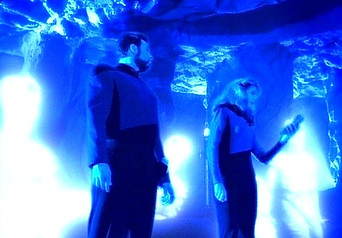
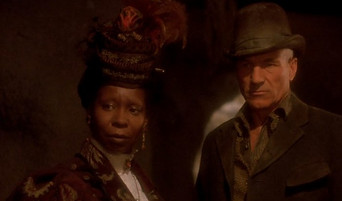
WATCH FOR CONTINUITY
Star Trek has rarely failed a time travel episode, and while this one is no exception, it is an overall weaker story than other comparable two-parters (or even standalones). This is partly due to the large amount of filler material that, while useful to color the era and give Clemens a big role, results in a slow and unfocused episode --- if a highly entertaining one. The premise is exceptional: Data’s head is found in a cave under San Francisco and dated to be about a half-millennium old. The finding jump-starts an exciting quest to stop a devious alien race from preying on 1800s humans. And if this wasn’t exciting enough, the writers pick this as Guinan and Picard’s backstory. This was a daring gamble, and for the most part it pays off. The episode is annoyingly vague about why Guinan is on Earth in 1893. Surely she has traveled there from space, given her familiarity with Data’s talk of spaceships; and yet she’s entirely unfamiliar with anything else when it comes to Picard, such as his technology or the very concept of time travel; and as we are given no explanation, we must fill in a lot of gaps. While this may be exciting for prospective non-canon authors, it is unnerving for the audience as a whole, as Guinan’s origin story is left criminally under-explained. Twain/Clemens is another gamble, and it too is a mixed bag. On the one hand, Jerry Hardin brings the character to life better than anyone else could have, and the scenes on the Enterprise are genuinely entertaining. On the other hand, Twain is so accessory to the main plot that his role could have been excised with no consequences, so it becomes difficult to justify such emphasis. In the end, the script amounts to more than the sum of its parts and “just works,” as it were. But other than a handful of funny gags, the botched attempt at Picard-Guinan, and one political conversation about the future of humankind, the episode has little to say, and it shows.
The crew meet ambassadors from a highly unusual species.
7.2 LIAISONS
The premise is valid: a species whose diplomacy relies on undercover infiltration. However, the execution leaves much to be desired. First, their choice of which facets of humanity deserve the most attention (recreation, love, and authority) is debatable in the utmost. Second, the execution is shoddy at best, for none of the ambassadors are the slightest bit sympathetic. What we end up with is a lot of campy humor on the ship and a poorly scripted hostage situation on the planet. All of this might be tolerable if there was a syncretic unity to the three plot arcs, or if the payoff was deep and meaningful — but alas, neither is the case, so the episode remains mediocre.
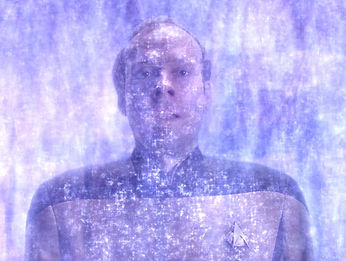
SKIPPABLE
7.3 INTERFACE
Geordi sees the spirit of his recently disappeared mother in a starship wreck.
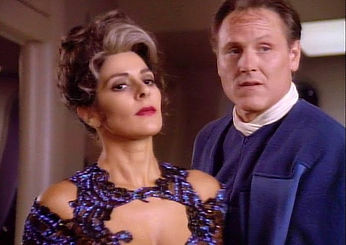

SKIPPABLE
The usual why-won’t-anyone-believe-me trope sucks, because often it propagates a mistaken view of epistemic justice (“only I can know the real truth!”). This episode avoids some of those pitfalls by changing course toward the end, when Geordi himself realizes that his beliefs were erroneous. The eventual resolution is not ordinary, either, as the aliens of the week have innocent motives for their deception. Overall, the episode has highs and lows. On the one hand, the interface tech is fascinating. One wonders why the crew don’t do a lot more exploring this way, which is surely safer. Also, La Forge’s character acquires a much-needed depth via a personal story arc that doesn’t rely on him trying to get laid. On the other hand, there were better ways to bring his family into focus: a tech-heavy gimmicky plot with shady aliens is way too distracting. Likewise, Data’s involvement is heartwarming as it is misguided: the character lacks the emotional depth to be able to disregard orders in this brazen fashion, and while I appreciate that sometimes writers have to push the boundaries of what they can do with an emotionless android, there was a little too much pushing here (Crusher, for example, would have been a better partner in crime).
Picard infiltrates a mercenary crew who's hunting for Vulcan relics.
7.4/7.5 GAMBIT (I-II)
Along with S6’s “Birthright,” this episode is a reminder that some two-parters should have been one-offs and vice-versa. There is no need for the plot to drag along as much as it does, and too many of Picard and Riker’s antics on the mercenary ship are superfluous. As a result, the script suffers from slowness and redundancy. That’s too bad, because the premise is fantastic. Picard’s passion for archaeology intertwines seamlessly with a tight spy story that shows an underbelly of the Star Trek universe that we rarely see before DS9. The eventual discovery of an ancient Vulcan superweapon is a great twist, though the mythology could have been developed a lot better than one clumsy extremist. As with many TNG episodes, this one lacks a believable and sympathetic villain, a problem that won’t plague DS9 and VOY as much. None of the mercenaries elicit any strong feelings, least of all Baran, who looks a coked-out 1970s rock star. Surely the narrative core of the episode is the Riker-Picard cooperation, and on that score it delivers. Data’s role as interim captain is also quite convincing, so much in fact that I would have loved to see more of it in other episodes. Like most of the show’s final season, this installment is a mixed bag as well, with moments of brilliance mixed with clear signs that the writers were running out of juice. Fun fact: Robin Curtis (Star Trek II-III) plays a Vulcan again, but of course not Saavik.


WORTH WATCHING
7.6 PHANTASMS
Data's dream program yields disturbing images as the ship malfunctions.
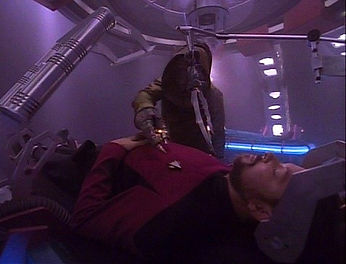
WORTH WATCHING
The only salvageable part of S6’s “Birthright,” Data’s dream, receives a superb once-over in this mystery thriller with a metaphysical tale of self-discovery. At first it seems like we are about to witness another step in Data’s personal evolution; but soon the emphasis shifts from the dreams to the crisis they help uncover. The concept is creative and fun to watch: Data’s version of a subconscious picks up the presence of bug-like creatures infesting the ship, as well as how to defeat them. And while the mechanism that drives the infestation isn’t entirely clear, the mystery remains intriguing. The occasional comic relief, with Worf cat-sitting and a holographic Dr. Freud calling Data a pervert, helps relieve the tension in an otherwise disturbing episode, full of intense and powerful imagery. Star Trek rarely gets dream or vision episodes wrong, at least from the point of view of visual suggestiveness, and this one is no exception.
A long-past trauma haunts Lwaxana Troi's telepathic subconscious.
7.7 DARK PAGE
TNG reviewers often rank episode badly or as average at most. I think it’s exceptional. It is an extremely accurate depiction of trauma, driven by an intelligent and sensitive script and Barrett’s strong performance. That the trauma that plagues Lwaxana isn’t revealed until the last few minutes takes nothing away from the tension that builds up throughout the episode. The non-verbal Cairn, who are only now learning to speak, are perfect symbols for the inability to process and express trauma, which often feels like an internal dissonance between the world of feeling and the world of language. As bigger and better sci-fi reminds us (Mimsy Were the Borogoves, Arrival), thought and language are intertwined at a deep logical level, which this script also captures via the Cairn. And when Lwaxana’s trauma is revealed for the soul-killing tragedy that it is, the rest of the script snaps into place and makes even more sense. Hilary Bader, who wrote the similarly sensitive S4’s “The Loss” and S5’s “Hero Worship,” concocts a scenario that brings mother and daughter together meaningfully; retroactively explains Lwaxana’s overprotectiveness; and is entertaining and heartbreaking to watch, too. That is a great feat. Fun fact: 9-year-old Kristen Dunst guest stars as Hedril!
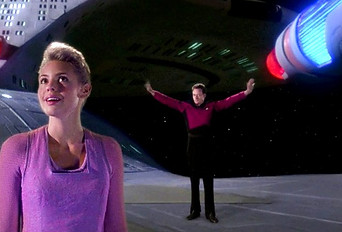
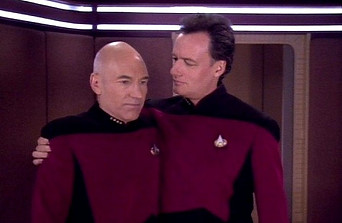
SEASON BEST
7.8 ATTACHED
Picard and Crusher realize their mutual feelings after their thoughts are linked.

WORTH WATCHING
The premise for this episode is entirely banal and commonplace: two rival factions on a nondescript alien planet whose diatribe somehow becomes relevant for the Enterprise. Obviously, all of that is a pretext for Picard’s and Crusher’s exploration of their mutual feelings. This is well constructed and carried out realistically. The dialogue isn’t larger than life and the script has the necessary subtlety to remain believable despite the absurd premise. Of course, the ending is most important. The mutuality that Picard and Crusher had built up is swept away as their opinions on how to act out on their feelings differ, an interesting and valid reaction to the acknowledgment of the similarity of those feelings. And while the ending is bittersweet, it’s legitimate and fully in keeping with TNG’s habit of greatly understating romance.
The ship finds a space area polluted by excessive warp usage.
7.9 FORCE OF NATURE
The bad news first: the script wastes so much time in the first two acts — a whopping fifteen minutes — on two subplots that turn out to be entirely irrelevant in the end: whether Spot can be trained and the disappearance of a Ferengi ship and a Federation vessel. This makes the eventual main plot, when it arrives suddenly halfway through, both unexpected and greatly under analyzed. This is especially upsetting considering how exceptionally good it is: the warp-capable civilizations’ reckless use of warp engines is damaging subspace and no one knows how to reverse the problem. The parallels with global warming are obvious, and there several good conversations about all the principal aspects of that debate: the clarity of the scientific data, the reluctance of even the smartest people to be convinced, the radical vs. moderate approaches of environmental activists, and the importance of swift action to fix the issue. Unfortunately, all of these topics are crammed in the script’s final three acts, and they would have deserved more thorough treatment. Despite this, the episode’s second half is wildly thought-provoking and entirely entertaining. The eventual technobabble-heavy resolution is clever and unheard of in previous episodes, and most importantly it is consistent with the spirit of the episode’s main message: conservation through abstinence (e.g., the Enterprise cannot use warp engines to get out of a warp-related problem). With a more sensible and comprehensive treatment, this episode could have been among the series’ best, but as it is it’s just above average.
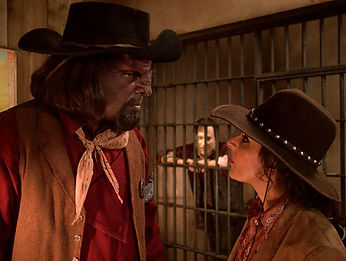

WORTH WATCHING
7.10 INHERITANCE
Data meets a woman who claims to be his mother.
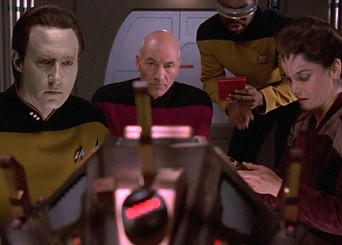
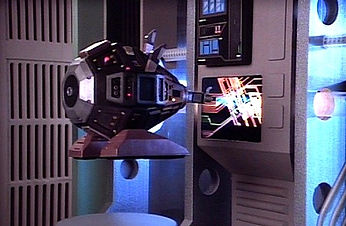
WORTH WATCHING
Data’s backstory finds an unexpected and intriguing new chapter with the discovery of his mother, the late Dr. Soong’s wife who contributed to his construction. Most of the episode is spent developing a familial rapport from scratch, which is successful thanks mostly to Fionnula Flanagan’s nuanced and intelligent performance. But in the final act the episode takes a huge narrative turn as Juliana is revealed to be a Soong-type android unbeknownst to herself, so the moral dilemma changes too: should she be told or not? I wish this question had been given a more exhaustive treatment, although it was still necessary to build up Juliana as a full and rounded character so that the audience could sympathize with the dilemma’s moral weight. Data’s eventual decision is sensible, but more important than the decision itself is his reasoning: in keeping with his personality, Data opts for the choice that satisfies his late father’s wishes and preserve his mother’s happiness, but to his own detriment, who can’t share his artificial nature with her. His turmoil in the ending is well written and portrayed beautifully by Spiner, though once again I would have preferred to see it played out more. Still, this is a very good installment and a worthy conclusion to Data’s personal and family history before the movies.
Worf and Alexander are trapped in a malfunctioning holodeck.
7.11 PARALLELS
...
’ “ ”
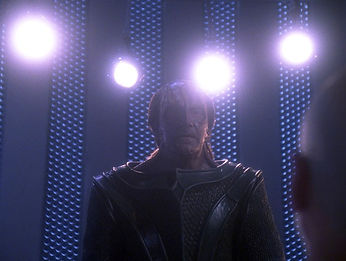
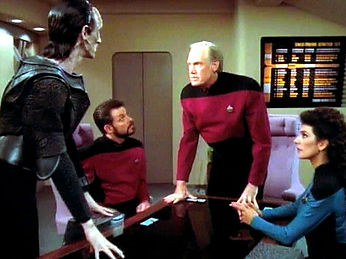
7.12 THE PEGASUS
The crew search for an old ship with a top-secret experiment aboard.
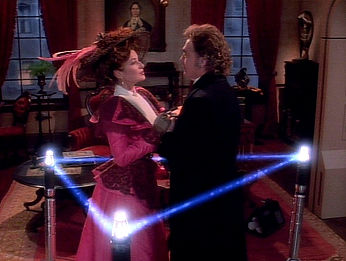
...
’ “ ”
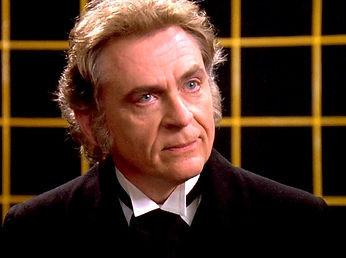
WORTH WATCHING
Worf's stepbrother violates the Prime Directive on a remote planet.
7.13 HOMEWARD
...
’ “ ”

SKIPPABLE
7.14 SUB ROSA
Crusher is possessed by a ghost that hunted her family for 800 years.


WORTH WATCHING
...
’ “ ”
Four junior officers struggle with daily life on the Enterprise.
7.15 LOWER DECKS
...
’ “ ”
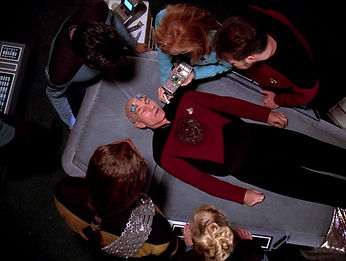

7.16 THINE OWN SELF
Data is stranded on a primitive planet with a radioactive payload.

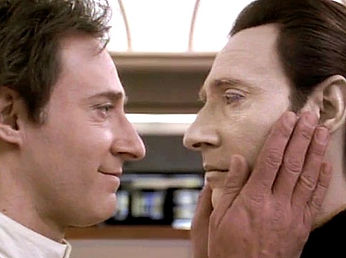
SKIPPABLE
...
’ “ ”
A 90-million year old alien archive transforms the Enterprise into an ancient temple.
7.17 MASKS
...
’ “ ”


7.18 EYE OF THE BEHOLDER
Troi investigates the telepathic echo of an old murder.


SEASON BEST
...
’ “ ”
A mutated virus causes the crew to de-evolve into more basic life-forms.
7.19 GENESIS
...
’ “ ”
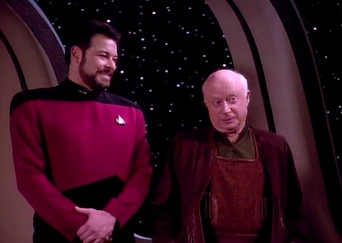

7.20 JOURNEY'S END
Riker questions his sanity in an alien mental hospital.

...
’ “ ”

Crusher investigates the death of a scientist during a symposium.
7.21 FIRSTBORN
...
’ “ ”

WORTH WATCHING
7.22 BLOODLINES
Legendary Klingon God-Emperor Kahless returns after millennia.

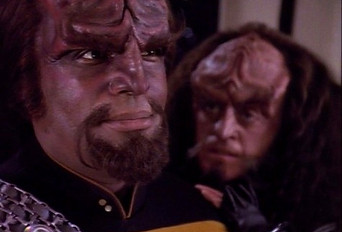
SKIPPABLE
...
’ “ ”
A transporter accident brings back a past version of Riker.
7.23 EMERGENCE
...
’ “ ”

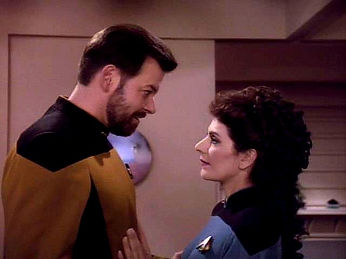
WORTH WATCHING
7.24 PREEMPTIVE STRIKE
Picard, Troi, Data, and La Forge find the Enterprise frozen in time.
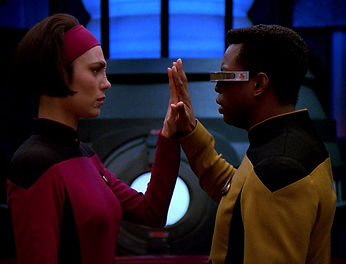

WORTH WATCHING
...
’ “ ”
Q forces Picard to travel to the past and to the future
in order to save humanity from permanent extinction.
7.25/7.26 ALL GOOD THINGS... (I-II)
...
’ “ ”




